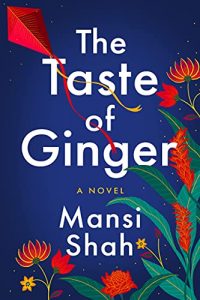Not So Represented
Not So Represented
By Mansi Shah
 It wasn’t until the age of 40 that I was able to read a novel about a Gujarati family, and that lack of representation left a deep impression on my soul. I grew up with a love of reading, often reading two books a day during my summer holidays from school, maxing out my library card on each visit and forcing my mom to drive me back every five days to replenish my stack. But in the countless books I’d read, I’d never read about characters who had names, food, mannerisms, and cultural references that were similar to mine. As I entered adulthood, I had a hard time reconciling my love of reading with how difficult it was to see myself in the stories that were available. So, like many headstrong women in their late-twenties, I decided I was going to write the story that I wished had existed for me when I was younger.
It wasn’t until the age of 40 that I was able to read a novel about a Gujarati family, and that lack of representation left a deep impression on my soul. I grew up with a love of reading, often reading two books a day during my summer holidays from school, maxing out my library card on each visit and forcing my mom to drive me back every five days to replenish my stack. But in the countless books I’d read, I’d never read about characters who had names, food, mannerisms, and cultural references that were similar to mine. As I entered adulthood, I had a hard time reconciling my love of reading with how difficult it was to see myself in the stories that were available. So, like many headstrong women in their late-twenties, I decided I was going to write the story that I wished had existed for me when I was younger.
By that point in my life, I had lived in four countries (Canada, America, Australia, and England), and felt like a foreigner in all of them. Home was a fleeting notion I couldn’t quite grasp, no matter how many passport stamps I collected. I had met so many people who could easily rattle off a hometown or country and feel innately like it belonged to them. I had never had that feeling and could not relate. I began questioning what home truly meant and if it could be something other than a physical place. I looked back at my assimilation and acculturation journey in the Western world and realized how much of it I had kept private. Feelings I had pushed down for decades bubbled up. My goal of blending in no longer seemed worthy or attainable. But I was so heavily shaped by the media that I didn’t think life-stories like mine were worth telling.
In my thirties, I began working in Hollywood, and was again surrounded by narratives that didn’t reflect my lived experience. I began to appreciate how much representation matters and how much impact it can have as we do the hard work of learning who we are. As an immigrant, I had often felt displaced—not belonging to the country of my culture or the one in which I lived. I knew I was not alone, but where were those stories? I realized they were sitting in the minds and on the computers of people like me—people who had something to say but no one to listen—and I knew I needed to get The Taste of Ginger into the world.
Conscious of writing for a white audience, in my early drafts I believed I shouldn’t write anything that made that demographic uncomfortable. I tiptoed around issues about race and culture that might be triggering, hinting at them, but never fully committing. With each revision, I became bolder. I deepened my story, doing my best to write for myself and for other immigrants who may be struggling with identity and belonging. I stopped worrying about how white readers would receive it and my words flowed. The thoughts and experiences I had kept hidden bled into the fiction I created. The vulnerability I felt terrified me, but I knew there was no other way. Yet, while I was finally ready to speak, the world was not ready to listen.
In my decade-plus quest to publication, I had to break down many barriers. “We already have an Indian author on our list,” said one agent. “The India wave is over,” said another. “Your voice and story are good, but there’s no market for these novels,” I heard again and again from publishers. I wrestled with others’ assumption that my culture was a trend like bootleg jeans, something to come and go, and that I’d need to wait for the next wave for my words to matter.
The mountain of rejections was clear: Stories about my culture were difficult to sell to American publishers. But my desire to contribute to representation in storytelling burned brighter than ever. I knew that readers were waiting for voices like mine, and in Fall of 2020, amid a global pandemic and racial reckoning, I got the news that the novel I feared would live only on my laptop would finally make its way into the world. At last, the timing was right.
Difficult as it often was, I am grateful for my journey to get here. By having so many years pass, by gaining my own insights about my identity, by developing the courage to use my voice, I am better able to represent my community and others like mine. The book being published today is more authentic than the one I wrote in 2009. But my novel reflects only one such immigrant experience, and there are so many more that we have yet to read about.
Thankfully, representation across the board is becoming a higher priority, although there is still a long way to go. In my forties, I’m now able to read stories about Gujarati families, and I can feel how much that has impacted me. I’m no longer that little girl searching bookstacks for a character who looks like me. I’m the author lifting her voice to change libraries forever so that future generations of immigrants will see their stories told. My hope is that when people who have felt isolated or displaced flip through the pages of books like The Taste of Ginger, they will feel seen, and these stories will help them find their own way home.
—
Mansi Shah is a writer who lives in Los Angeles. She was born in Toronto, Canada, raised in the midwestern United States, and studied at universities in America, Australia, and England. When she’s not writing, she’s traveling and exploring different cultures near and far, experimenting on a new culinary creation, or trying to improve her tennis game.
Social media:
Website: https://www.mansikshah.com/
Instagram: https://www.instagram.com/mansishahwrites/
Facebook: https://www.facebook.com/mansishahwrites/
Twitter: https://twitter.com/mansiwrites
Goodreads: https://www.goodreads.com/author/show/7043173.Mansi_Shah
THE TASTE OF GINGER
 In Mansi Shah’s stunning debut novel, a family tragedy beckons a first-generation immigrant to the city of her birth, where she grapples with her family’s past in search of where she truly belongs.
In Mansi Shah’s stunning debut novel, a family tragedy beckons a first-generation immigrant to the city of her birth, where she grapples with her family’s past in search of where she truly belongs.
After her parents moved her and her brother to America, Preeti Desai never meant to tear her family apart. All she did was fall in love with a white Christian carnivore instead of a conventional Indian boy. Years later, with her parents not speaking to her and her controversial relationship in tatters, all Preeti has left is her career at a prestigious Los Angeles law firm.
But when Preeti receives word of a terrible accident in the city where she was born, she returns to India, where she’ll have to face her estranged parents…and the complicated past they left behind. Surrounded by the sights and sounds of her heritage, Preeti catches a startling glimpse of her family’s battles with class, tradition, and sacrifice. Torn between two beautifully flawed cultures, Preeti must now untangle what home truly means to her.
BUY HERE
Category: On Writing






























